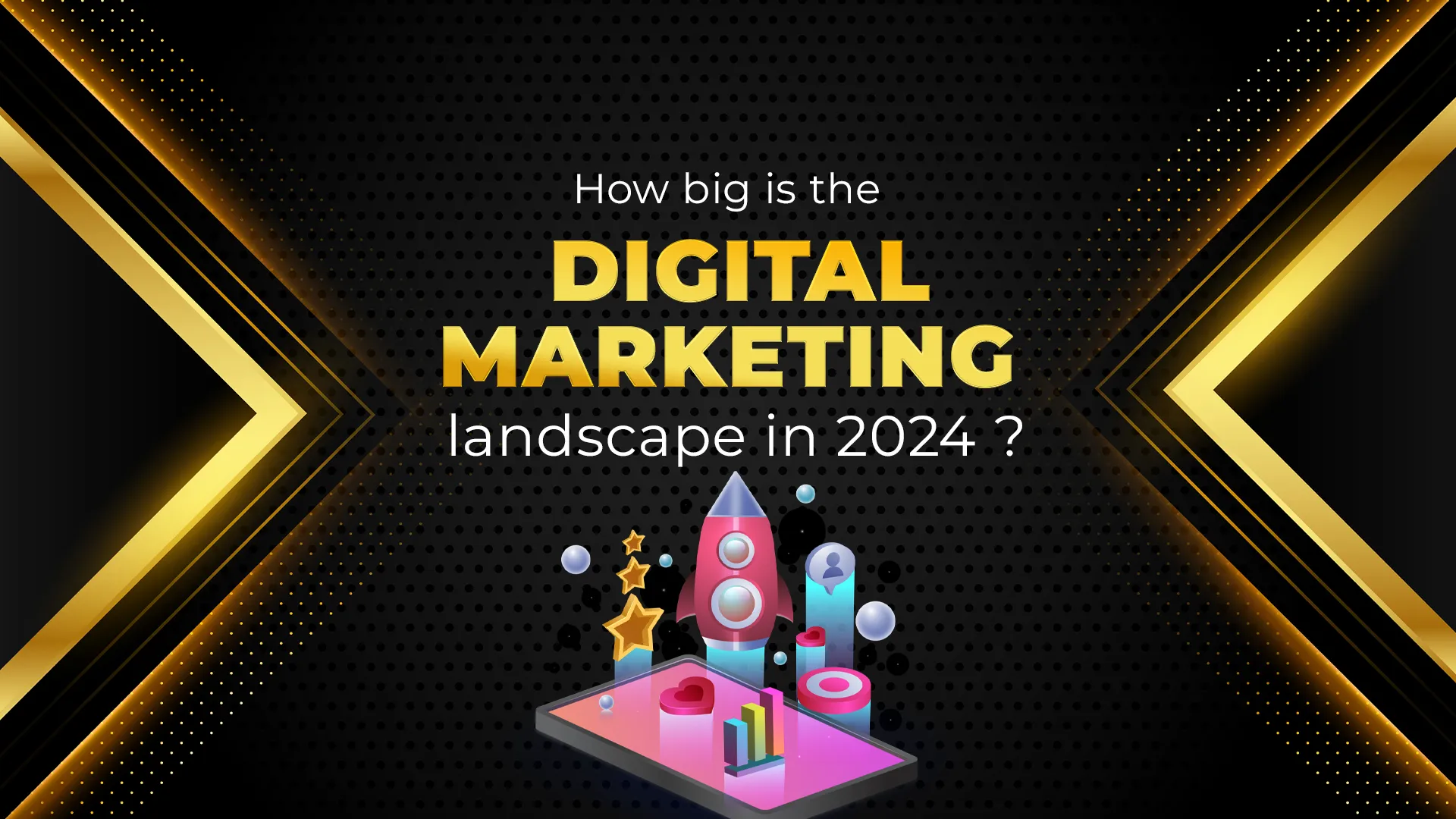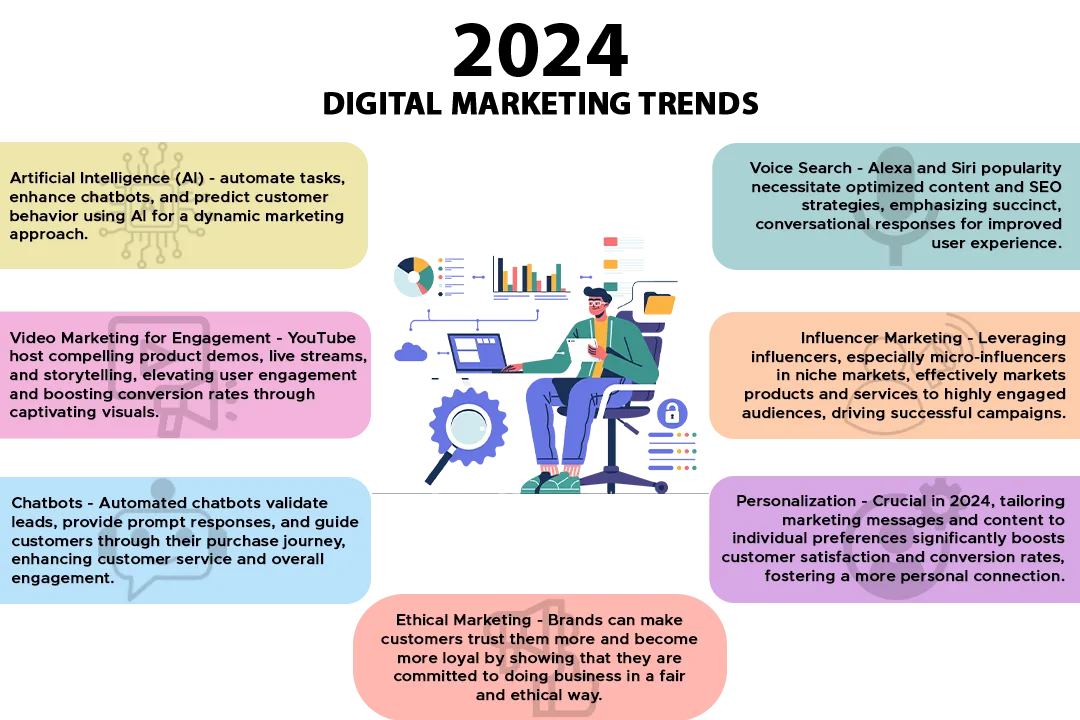The world of marketing has experienced a revolutionary shift with the emergence of technology and the internet. As we enter the year 2024, the digital marketing landscape is undergoing continuous expansion, reshaping the way businesses establish connections with their target audience. In this comprehensive guide, we explore the fundamental components, key strategies, and emerging trends that characterize the digital marketing landscape in 2024.
Understanding the Digital Marketing Landscape
The digital marketing landscape comprises a diverse array of channels, platforms, and strategies. Grasping the fundamental components is imperative for navigating this ever-evolving field:
Websites: Functioning as a virtual storefront, information hub, and primary interaction point with customers, websites are integral to an online presence.
Social Media: Platforms such as Facebook, Instagram, Twitter, and LinkedIn offer unique avenues for engagement, brand building, and driving conversions.
Email Marketing: Serving as a cost-effective means to reach customers directly, email marketing allows businesses to send newsletters, promotions, and personalized messages.
Search Engine Optimization (SEO): Through content optimization and adherence to best practices, businesses can enhance search engine rankings, attracting more organic traffic.
Mobile Marketing: Recognizing the prevalence of mobile device usage, creating mobile-responsive websites, apps, and campaigns is essential for reaching on-the-go audiences.
Role & Importance of Each Component
Every component within the digital marketing landscape plays a crucial role in achieving overall marketing objectives:
- Websites: Establish credibility, offer vital information, and generate leads.
- Social Media Platforms: Foster engagement, user-generated content, and brand awareness.
- Email Marketing: Strengthen customer relationships and facilitate effective communication.
- SEO: Increase online visibility, drive organic traffic, and improve conversion rates.
- Mobile Marketing: Ensure a seamless user experience across devices.
Digital Marketing Landscape and Strategy in 2024
Digital marketing, a vast subject, encompasses various online activities aimed at attracting potential customers, engaging them, and ultimately securing sales. In 2024, the digital marketing landscape is witnessing significant growth as user numbers increase, and even physical store owners integrate digital marketing into their plans for maximum outreach.
The Digital Marketing Journey
Setting Objectives
The foundation of every successful digital marketing campaign lies in clear objectives. Setting SMART goals (Specific, Measurable, Achievable, Relevant, Time-bound) is crucial, whether aiming for increased brand awareness, more website traffic, higher sales conversions, or a combination.
Understanding Your Audience
Effective digital marketing relies on intimate knowledge of the target audience. Conducting persona development and market research helps uncover demographics, interests, pain points, and online behavior.
Choosing the Right Channels
Not all digital marketing channels suit every business. Choosing platforms aligned with the audience and objectives is crucial; for instance, B2B companies might find LinkedIn more effective, while visually appealing products could shine on Instagram.
Creating Compelling Content
Content forms the foundation of digital marketing. High-quality, engaging content is crucial for SEO, social media, and content marketing. It should educate, entertain, or solve problems for the audience.
Data-Driven Decision-Making
Analyzing data and key performance indicators (KPIs) is crucial in digital marketing. Tools like Google Analytics help measure success and adjust strategies accordingly, enabling more effective resource allocation and campaign optimization.
Latest Digital Marketing Trends
Artificial Intelligence (AI)
Through content personalisation, task automation (e.g., email marketing), chatbot enhancement, and predictive analytics (i.e., anticipating customer behaviour), artificial intelligence (AI) is revolutionising digital marketing.
Voice Search
The emergence of voice-activated gadgets such as Alexa and Siri is transforming content strategy and SEO tactics. It’s getting more and more crucial to optimise for voice search and provide succinct, conversational responses.
Video Marketing
Videos have become incredibly popular on websites like YouTube. Product demos, live streaming, and video storytelling are becoming increasingly effective methods for increasing user engagement and conversion.
Influencer Marketing
Working with social media influencers to market goods and services is becoming more and more common. For niche markets in particular, micro-influencers work exceptionally well because of their smaller but highly engaged audiences.
Chatbots and Conversational Marketing
Automated chatbots are improving customer service and engagement by validating leads, offering prompt responses, and assisting customers with their purchase journeys.
Personalization
Customising marketing messages and content to each person’s tastes is becoming more and more crucial. Customer happiness and conversion rates can both be greatly increased by personalisation.
Sustainability and Ethical Marketing
Consumers are becoming more and more concerned about ethical behaviour and sustainability. Brands can increase loyalty and trust by demonstrating their dedication to ethical business practices.
In conclusion, the digital marketing landscape in 2024 is expansive, dynamic, and continuously evolving. Businesses that embrace the latest trends, understand their audience, and adapt their strategies accordingly are poised for success in this digitally-driven era.
Take your first step towards success by getting the best marketing services.
FAQ’s
Why is digital marketing important for businesses?
Digital marketing is crucial for businesses as it allows them to establish an online presence, reach a wider audience, and engage with customers through channels like websites, social media, email, SEO, and mobile marketing. It helps in building credibility, fostering customer relationships, and driving conversions.
What are the benefits of digital marketing?
The benefits of digital marketing include increased online visibility, cost-effectiveness, targeted audience reach through various channels, improved conversion rates, seamless user experiences across devices, and the ability to analyze data for data-driven decision-making.
Do small businesses need digital marketing?
Yes, small businesses need digital marketing to compete in the digital age. It provides cost-effective ways to reach a wider audience, build brand awareness, and engage with customers directly. The digital landscape in 2024 emphasizes the growth of digital marketing as an integral part of business plans for maximum outreach.


